2014 年福建普通高中会考英语真题及答案
第Ⅰ卷(共 100 分)
第一部分:语言知识应用(共两节,满分 60 分)
第一节:语法及词汇应用(共 30 小题;每小题 1 分,满分 30 分)
从 A、B、C、D 四个选项中,选出可以填入空白处的最佳选项。
1. She found it difficult to _____ herself to the new surroundings.
A. adapt
B. force
C.
fit in
D. change
2. ---- Do you know our town at all?
---- No, this ________ the first time I _________ here.
A. was; has come
B. is; come
C. is; had come
D. is; have come
3. Children need many things, but _____ they need love.
A. the most important
B. above all
C. to their satisfaction
D. in general
4. The system has been designed to give students quick and easy ________to the digital
resources of the library.
A.access
B.passage C.way
D.approach
5. Many questions ______ at the meeting, but he answered none.
A. came up
B. raised
C. were risen
D. asked
6. _____ of the students who took part in the military training(军训) is 450.
A. A number
B. A lot
C. Lots
D. The number
7. A good learner is also a person who _________ notes when listening to a speech.
A. sets down
B. sets up
C. sets off
D. sets at
8. I am extremely ________at the way he always stares at me in the office.
A.troubled
B.worried C.annoyed
D.anxious
9. ---Will you go to the cinema with me this evening?
---I’d love to, but I have _____ work to do this evening.
A. too many
B. too much
C. much too
D. far too
10. I hurried to the meeting hall, only____ that the meeting had been put off.
A. to tell
B. to be told C. telling
D. told
11. He found ______difficult ______the work in two hours.
A. it; finished
B. it; to finish
C. its; to finish
D. this; finishing
�
12. The classroom wants __________.
A. clean
B. cleaned
C. to clean
D. cleaning
13. As a teacher,I seldom give my students so difficult a problem __________ they cannot
work out.
A.that
B.if
C.in order that
D.as
14. “I’m not a student. I’m a doctor here, ______,” he said to me.
A. yet
B. really
C. actually
D. still
15. They didn’t climb the mountain ______ the rain.
A. since
B. instead of
C. because
D. because of
16. I hadn’t seen her for 10 years, but I ______ her at once.
A. realized
B. recognized
C. knew
D. found
17. ______, more and more Chinese people are able to receive higher education.
A. In the future
B. In the past
C. At last
D. At present
18. The famous pianist refused our ______ that he should play it again.
A. order
B. warning
C. request
D. question
19. There was_______ time______ Iraq was one of the strongest countries in the world.
A. a; when
B. a; that
C. the; that
D. the; when
20. The boss commanded that the task ______ before 5 o’clock this afternoon.
A. was finished
B. finished
C. be finished
D. should finish
21. You have no idea of what I have had to __________ during the last three months.
A. come through
B. go over
C. look through
D. go through
22. Though we are in the same class, we ______ talk and know little about each other.
A. gradually
B. hardly
C. frequently D. always
23. John asked Tom ______ give him a lift to the office.
A. if he could
B. could you
C. if could he
D. if could
24. I’m very happy to see my sister again. ______, I haven’t seen her for nearly 20 years.
A. Whether or not
B. Believe it or not
C. That’s to say
D. To my surprise
25. I don't know when he ______, but when he ______, I'll let you know.
A. will come/comes
B. comes/will come
C. comes/comes D. will come/will come
26. You'd better ______ smoking, for it does great harm to your health.
�
A. give out
B. give in
C. give up
D. depend on
27. Judging from his ______ face, I know he is ______ at the news.
A. excited; excited
B. exciting; exciting
C. excited; exciting
D. exciting; excited
28. It was about 600 years ago ______ the first clock with a face and an hour hand was made.
A. that
B. until
C. before
D. when
29. ______ you put your heart into your study, you'll feel ______ in it.
A. If; interest
B. Once; interested
C. Since; interested
D. When; interesting
30. Susan’s knowledge of Canada was based only _______ what she had read in books.
A. on
B. in
C. from
D. for
第二节: 完形填空(共 20 小题;每小题 1.5 分,满分 30 分)
阅读下面短文,掌握其大意,然后从 36—55 各题所给的四个选项(A、B、C 和 D)中,选出最佳选
项。
Water costs money. In some places water is hard
31
. What
32
when a town has these
problems?A small town in California found a happy
33
.
Very
34
rain ever fell there. The town had no water
35
. The water it used was
36
from a river 300 miles away. As more people
37
live in the town,
38
water was
needed. Now water
39
to be brought in from 600 miles away. All these cost
40
money.
The town
41
a plan. It found an answer to clean its “___42___” water. Once the
cleaned water was reused
43
many ways. Five
44
lakes were built. Here people could
swim and fish and go
45
. They
46
have picnics in their new parks. Farmers had more
water
47
their crops. New factories can be built because they have the promise of
48
.
In most places, water is used and thrown
49
. The town that saved
50
water has saved
the town!
31. A. supplying
B. getting
C. to get
D. to supply
32. A. happens
B. happening
C. is happened
D. happened
33. A. line
B. answer
C. answering
D. way
34. A. little
B. a little
C. few
D. a few
35. A. of itself
B. of its own
C. for its own
D. for itself
36. A. fetch
B. took
C. brought in
D. guided
37. A. come to
B. came to
C. coming to
D. came for
38. A. many
B. plenty of
C. more
D. many more
�
39. A. has
B. had
C. must
D. needed
40. A. little
B. a few
C. a great many
D. a lot of
41. A. put
42. A. blue
43. A. for
B. made
B. hard
B. by
C. supply
D. noticed
C. dirty
D. soft
C. at
D. in
44. A. man-making
B. man-make
C. man-made
D. man made
45. A. boating
B. to boat
C. to boating
D. on boating
46. A. must
B. could
C. needed
D. had to
47. A. as
B. with
C. for
D. to
48. A. water enough
B. enough water
C. crops enough
D. enough crops
49. A. off
50. A. it’s
B. of
B. its
C. away
D. out of
C. one’s
D. their
第二部分:阅读理解 (共 20 小题;每小题 2 分,满分 40 分)
阅读下列短文,从每题所给的四个选项(A、B、C 和 D)中,选出最佳选项。
A
When you send a letter or a postcard, you have to put stamps on the envelope or on the
card. When did people first begin to use stamps? Who was the first to think of this idea?
In the early nineteenth century, people did not use stamps. They had to pay postage when
they received letters. They were unhappy about this, especially when they paid for a letter
which they did not wish to receive at all. The postage was high at that time, because the
post offices had to send many people to collect the postage.
Rowland Hill, a schoolmaster in England, was the first to put forward(提出) a proposal(提
议) to use stamps in the 1850s. He thought it would be much easier for people to use stamps
to cover postage. They could go to the nearby post office to buy stamps and put them on
envelopes before they sent the letters. The post office could simply put seals on the stamps
so that people could not use the stamps again. In this way, the post office did not need
to send postmen to collect postage. It only needed to send fewer postmen to deliver letters.
That was a good idea and the government finally accepted it.
51. It was not until _____ that people began to use stamps.
A. the early 19th century
B. the middle 19th century
C. the late 19th century
D. the beginning of the 19th century
�
52. Before stamps were used, postage ________.
A. was paid by the letter-posters
B. was paid by the letter-receivers
C. was collected by postmen
D. Both B and C
53. Rowland Hill was ________.
A. the designer of the first stamp
B. a postman in England
C. the suggestion-giver of using stamps
D. a postmaster of a small post office
54. After stamps were used, post offices needn’t _______.
A. send postmen to collect the postage
B. send postmen to collect letters
C. send postmen to deliver letters
D. put seals on the used stamps
55. Which of the following may be the best title of the passage?
A. When did people first begin to use stamps?
B. Who was the first to think of using stamps?
C. Why were postmen sent to collect postage?
D. How did stamps come into use?
B
Henry Ford was the first person to build cars which were cheap, strong and fast. He
was able to sell millions of models because he could produce them in large numbers at a
time;that is, he made a great many cars of exactly the same kind. Ford’s father hoped
that his son would be come a farmer, but the young man did not like the idea and he went
to Detroit(底特律)where he worked as a mechanic(机械师).By the age of 29, in 1892, he
had built his first car. However, the car made in this way, the famous “Model T” did not
appear until 1908-five years after Ford bad started his great motor car factory. This car
showed to be well-known that it kept unchanged for twenty years. Since Ford’s time, this
way of producing cars in large numbers has become common in industry and has reduced the
price of many goods which would otherwise be very expensive.
56. Henry Ford was the man to built _____ cars.
A. cheap and strong
B. cheap and long
C. fast and expensive
D. strong and slow
�
57. Ford was able to sell millions of cars, because_____.
A. he made many greet cars
B. his cars are many
C. he made lots of cars of the same kind
D. both A and B
58. The young man became a mechanic, _______.
A. which was his father’s will
B. which was against his own will
C. which was against his father’s will
D. which was the will of both
59.The “Model T” was very famous_____.
A. before 1908
B. between 1982 and 1908
C. before 1892
D. after 1908
60. Ford built his own car factory_________.
A. in 1903
B. in 1908
C. in 1913
D. in 1897
C
After explaining where my new house was, I told him that I had left the key under the
doormat. Since I knew it would be quite late before I could get back, I suggested that he
make himself at home and help himself to anything that was kept in the refrigerator(冰
箱).
Two hours later my friend phoned me from the house. At the moment, he said, he was
listening to some of my records after having had a nice meal. He had found the pan and meat
in the refrigerator. Now, he was drinking a cup of tea and hoped that I would join him soon.
When I asked him if he bad any difficulty finding the house, he answered that the only problem
was that he had not been able to find the key under the doormat, but luckily, the living
room window by the apple tree had been left open and he had climbed in through the window.
I listened to all this in great surprise. There is no apple tree outside my window, but
there is one by the living room window of my next-door neighbor’s house!
61. When my friend arrived, I could not go to meet him because________.
A. we were not good friends
B. I was busy at work
C. he had not told me that he would come
D. I did not want to see him
62. A doormat is a mat______.
A. used as a door
�
B. for cleaning the bottom of shoes
C. put up on a door as an ornament(装饰物)
D. for the refrigerator to be kept in
63. I listened to my friend’s phone call in great surprise because____.
A. he had not waited for me to eat together
B. he had eaten too much of the food
C. he mistook my neighbor’s house for mine
D. he had left the house with the window open
64. At last my friend______.
A. did not enter my house
B. entered my house after he opened the door
C. entered my house by climbing through the window
D. entered my house with the help of my neighbor
65. The writer left the key under the doormat so that______.
A. nobody would find it
B. he might not lose it
C. his family could use the same key
D. his friend could easily get it
D
Frank Woolworth was born in Rodman, New York., in 1852. His family were very poor farmers,
and there was never enough to eat. Frank decided he did not want to be farmer. He took a
short business course(课程), and went to work as a salesman in a large city.
Woolworth realized he had a natural skill for showing goods to attract(吸引) people’
s interest, but he soon learned something more important. One day his boss told him to sell
some odds and ends(小商品) for as much as he could get. Frank put all these things on one
table with a sign which said FIVE CENTS EACH. People fought and pushed to buy the things
and the table was soon cleared.
Soon afterwards, Woolworth opened his own store, selling goods at five and ten cents.
But he had another lesson to learn before he became successful. That is, if you want to
make money by selling low-price goods, you have to buy them in large quantities directly
�
form the factories. Once, for example, Woolworth went to Germany and placed an order for
knives. The order was so large that the factory had to keep running 24 hours a day for a
whole year. In this way, the price of the knives was cut down by half.
By 1919, Woolworth had over 1000 stores in the US and Canada, and opened his first store
in London. He made many millions and his name became famous throughout the world. He always
run his business according to strict rules, of which the most important was: “ THE CUSTOMER
IS ALWAYS RIGHT.”
66. Frank took a short business course in order to ____________.
A. earn more money for his family
B. learn something from a salesman
C. get away from the farm
D. get enough to eat.
67. Frank sold the odds and ends quickly because _____________.
A. he knew how to get people to buy his goods.
B. he cut down the price by half
C. he had put the goods on a table in a very nice way.
D. the sign he put on the table was well designed.
68. The price of the knives was cut down by half because ______________.
A. the factory workers worked 24 hours a day.
B. knives were ordered in large quantities directly from the factory.
C. the knives were made in Germany, where labor (劳动力) was cheap.
D. the knives were produced in one factory.
69. ______ makes Woolworth a world-famous man.
A. His business skills and his wealth.
B. The low price of the goods he sold.
C. His trip to Germany and his huge order of knives.
D. His natural skill for showing things.
70. The belief that: “The customer is always right” suggests that _______________.
A. whenever there is a quarrel between the customer and shop assistant, the customers
are always right.
B. If you want to succeed, the rule is the only way.
�
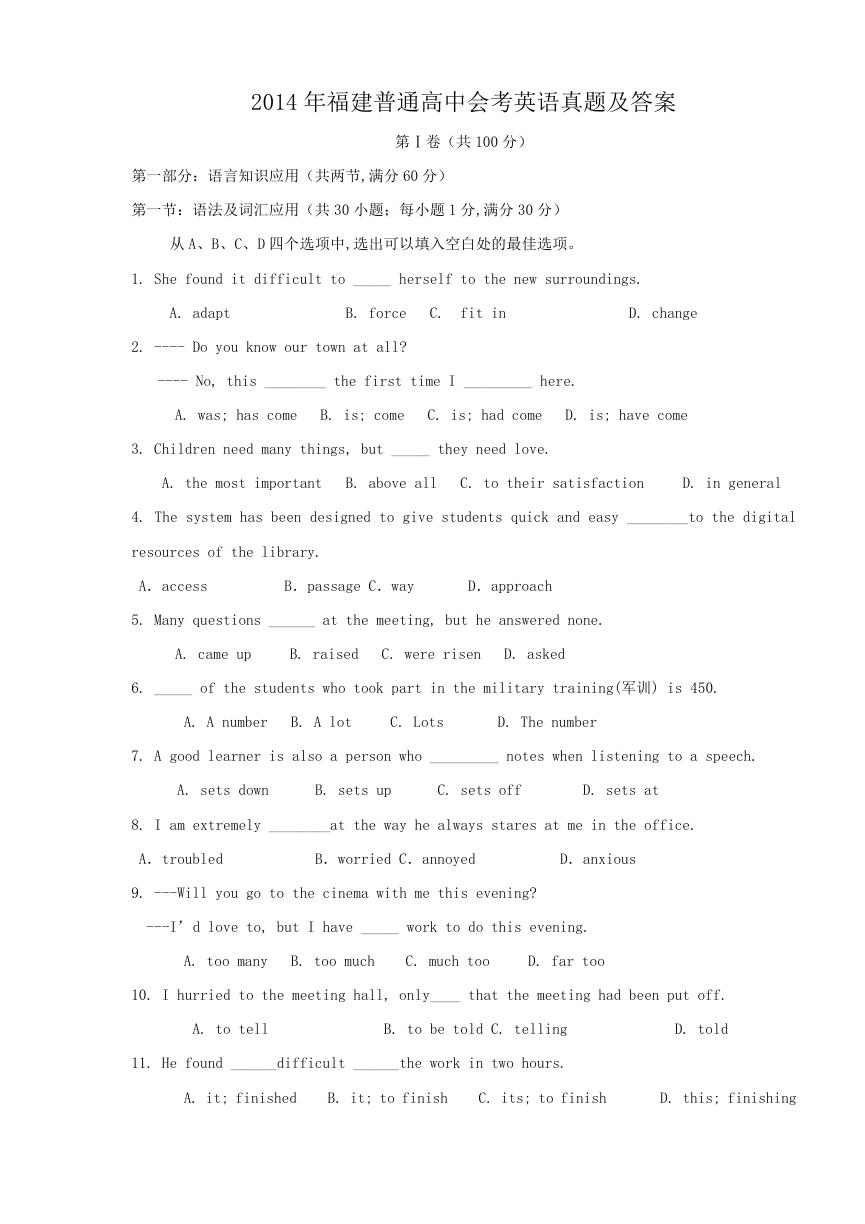
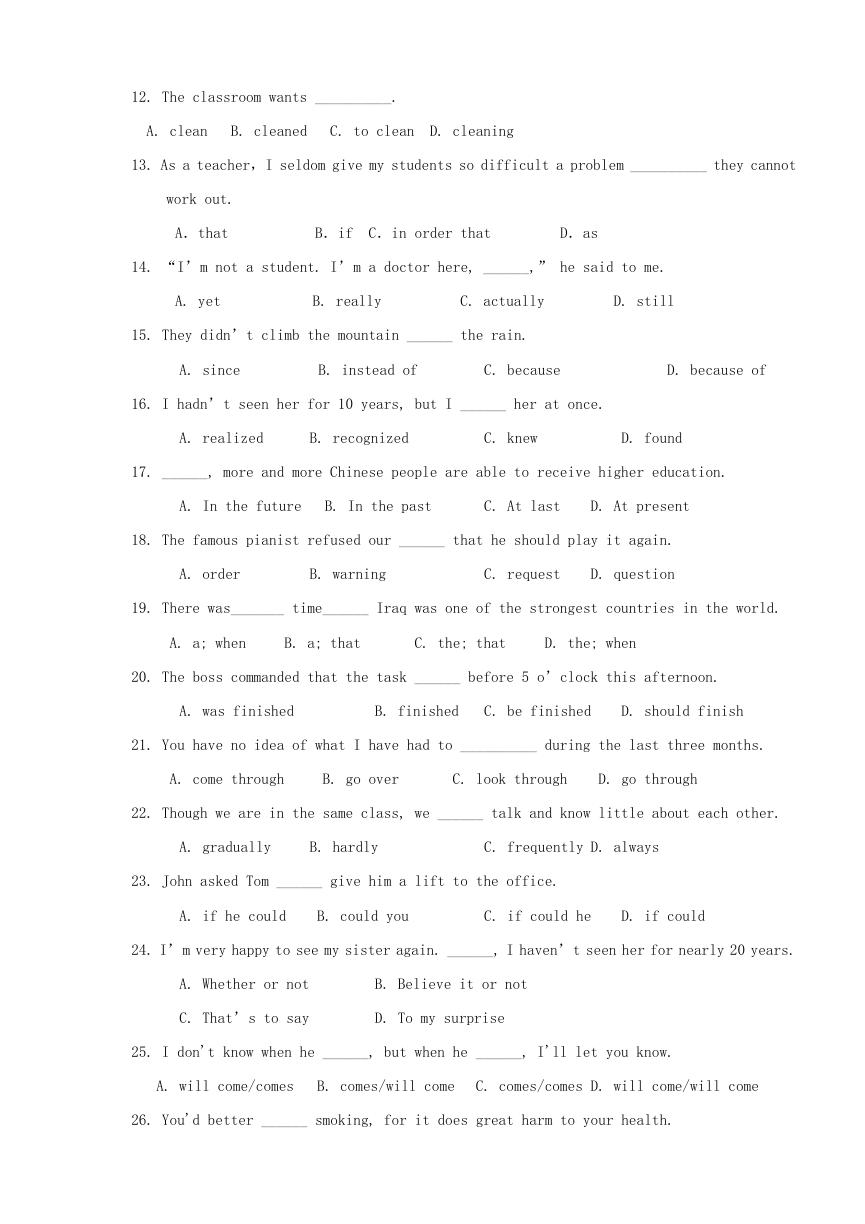
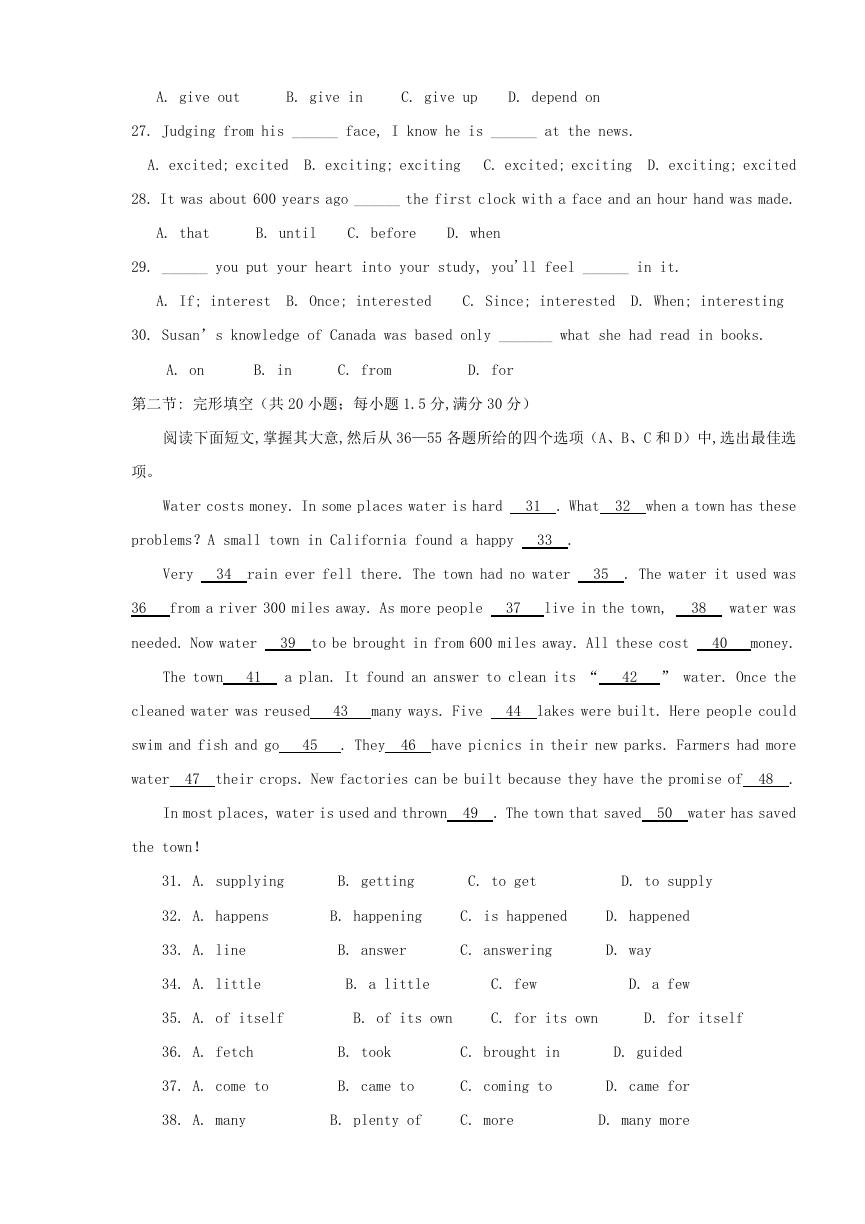
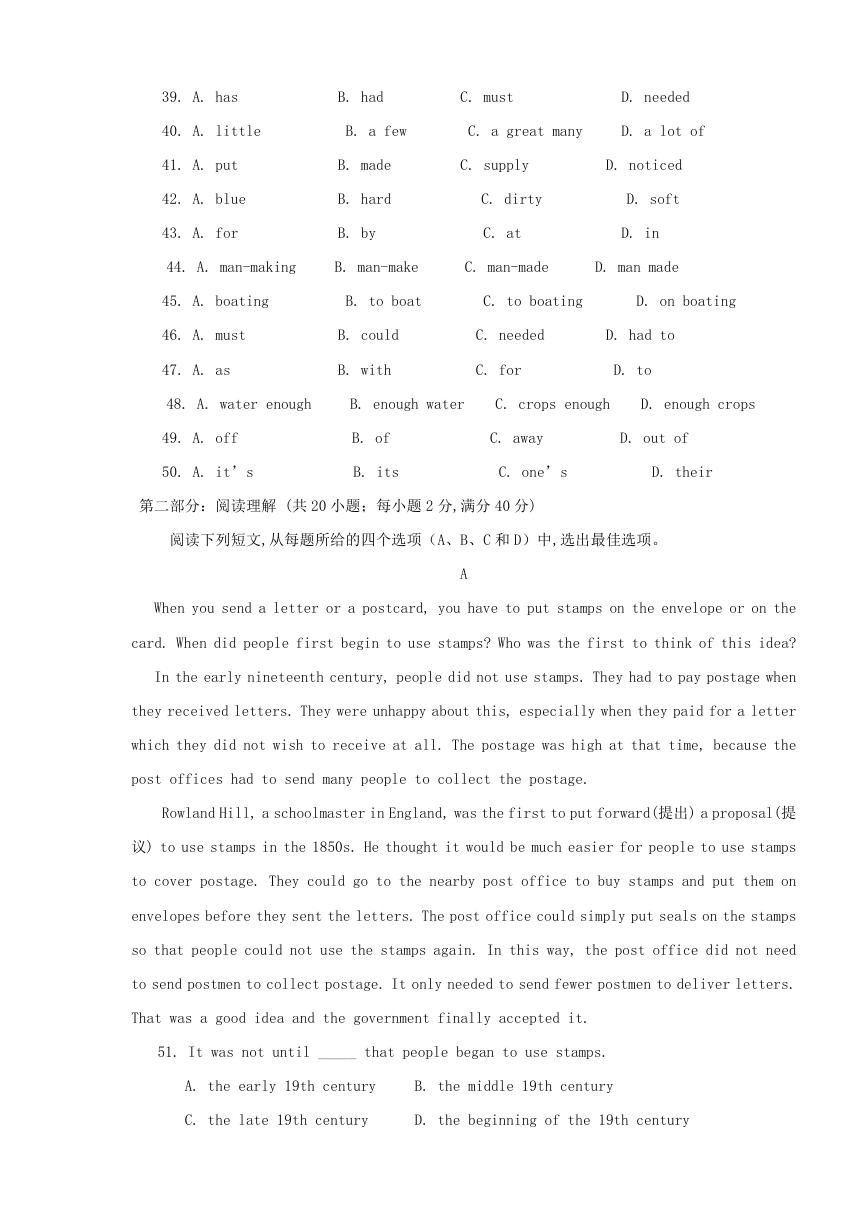
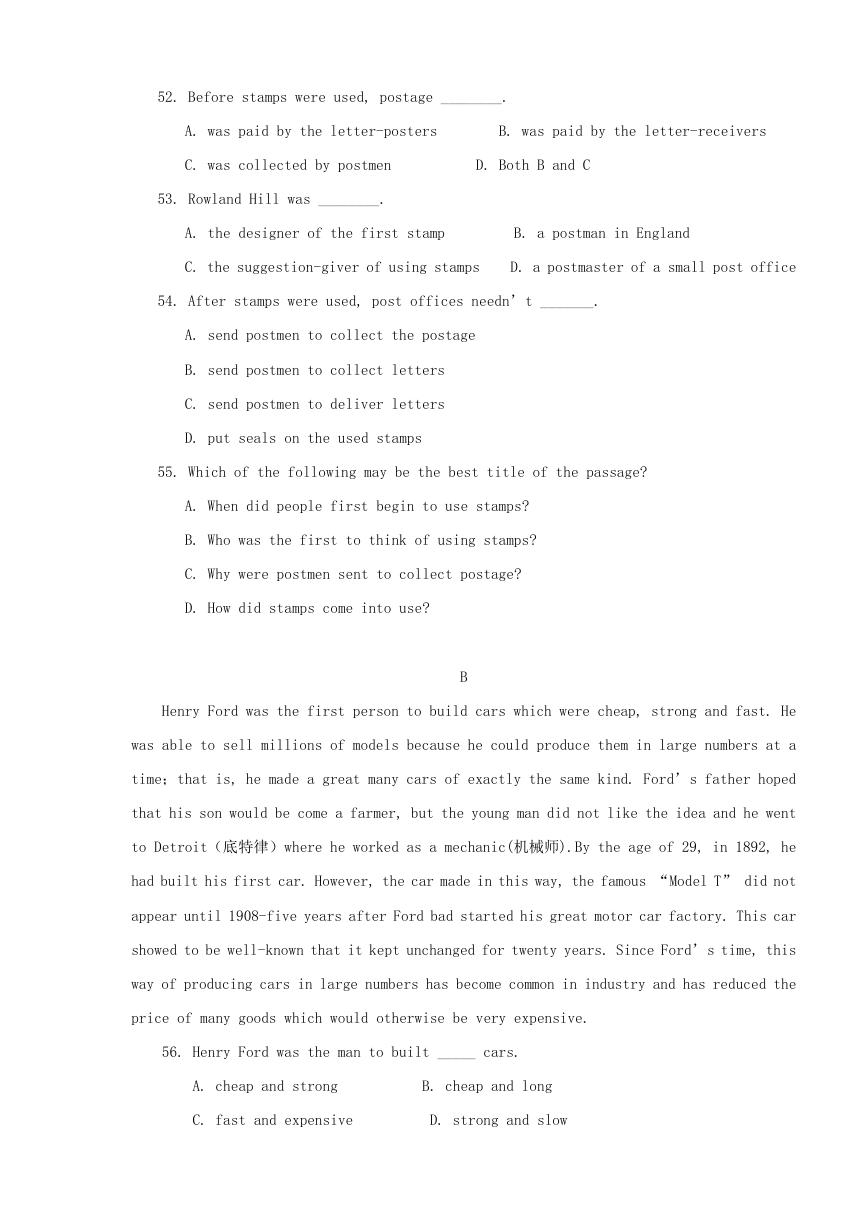
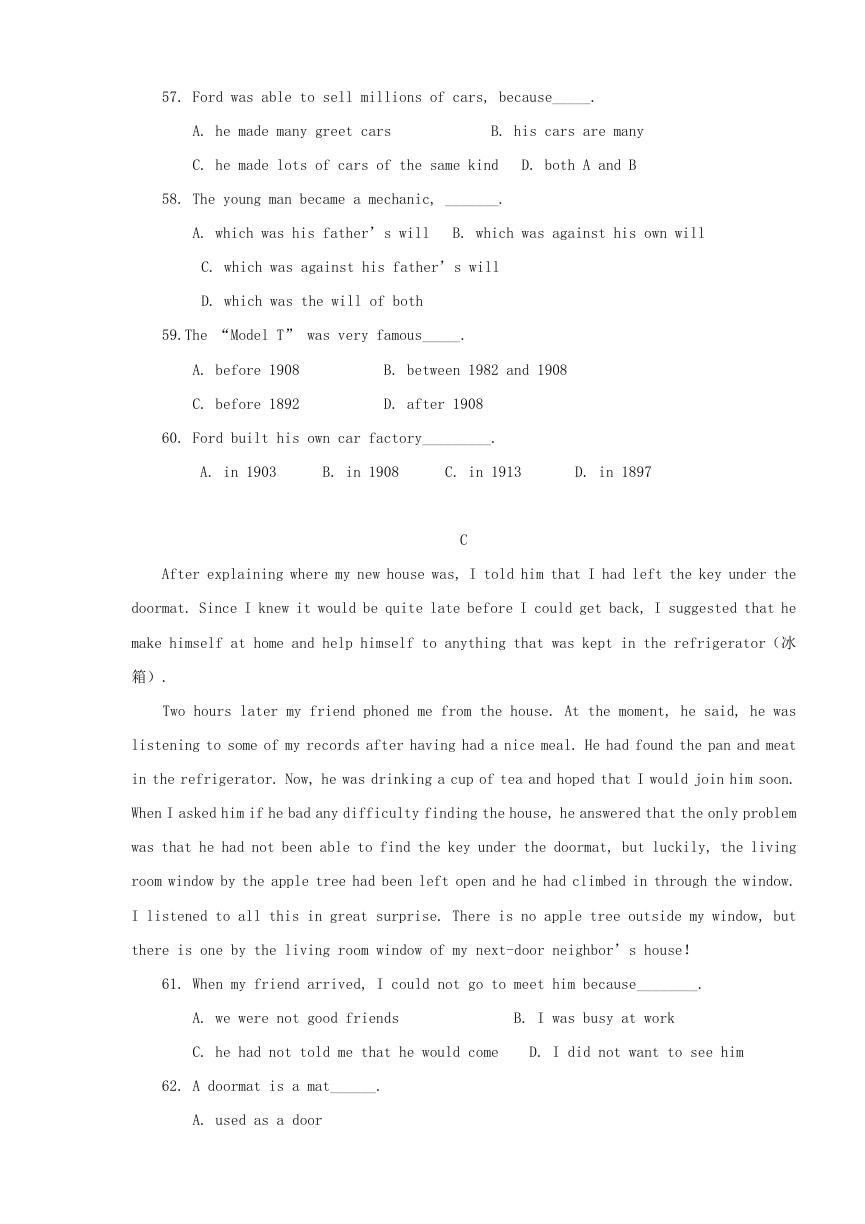
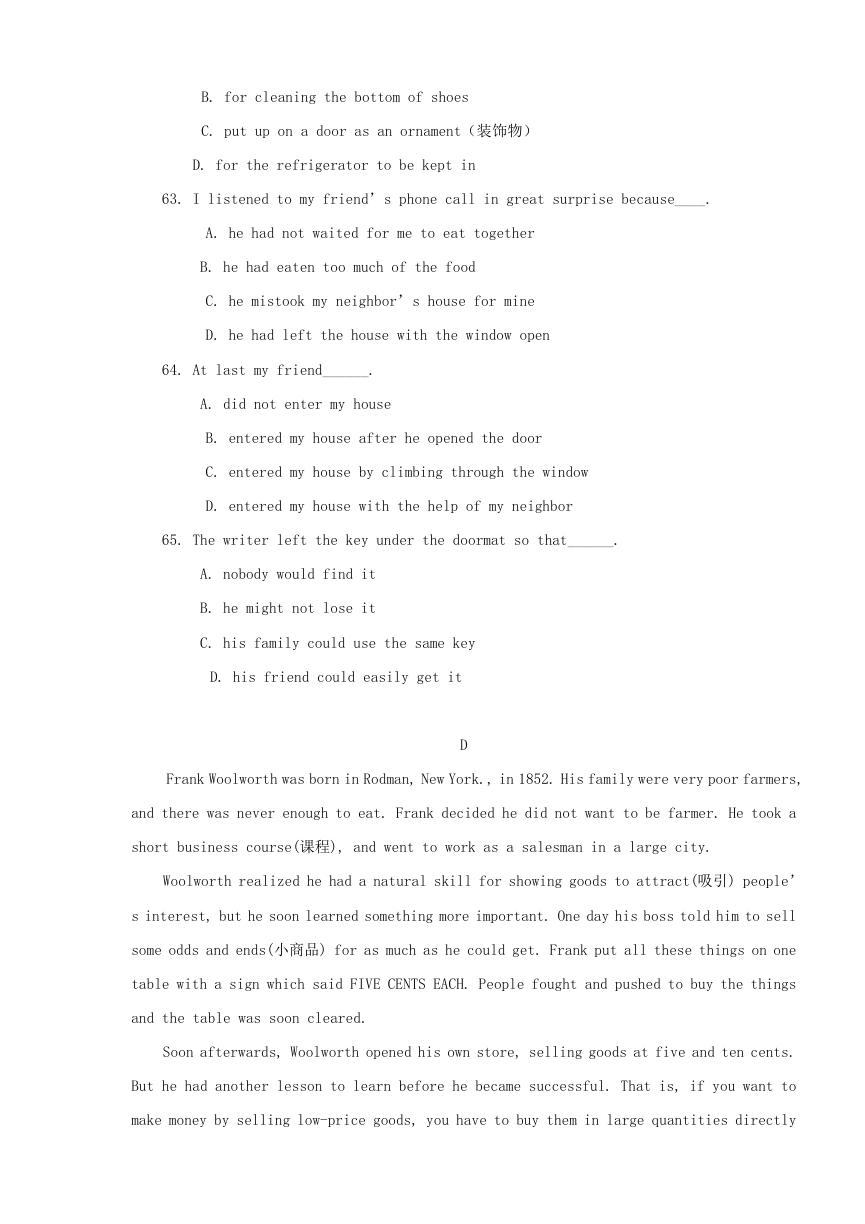
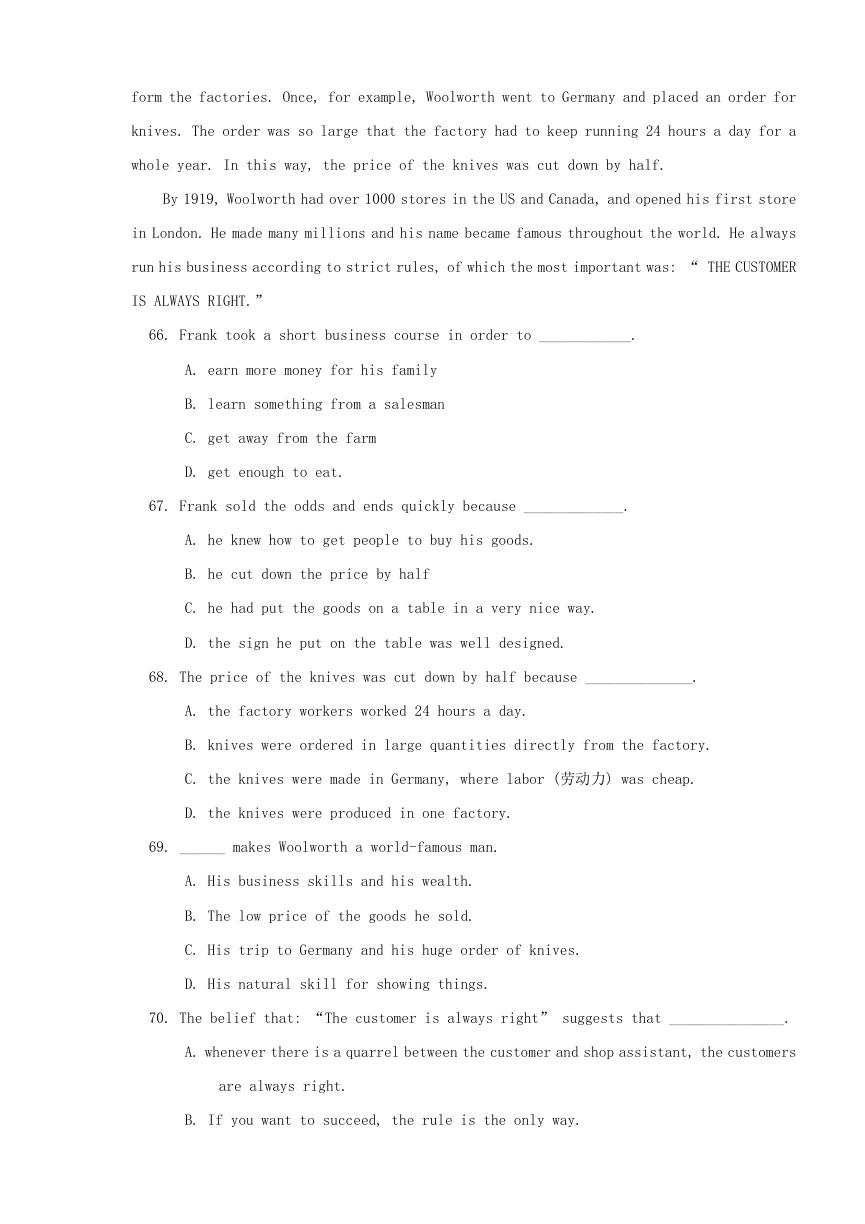








 2023年江西萍乡中考道德与法治真题及答案.doc
2023年江西萍乡中考道德与法治真题及答案.doc 2012年重庆南川中考生物真题及答案.doc
2012年重庆南川中考生物真题及答案.doc 2013年江西师范大学地理学综合及文艺理论基础考研真题.doc
2013年江西师范大学地理学综合及文艺理论基础考研真题.doc 2020年四川甘孜小升初语文真题及答案I卷.doc
2020年四川甘孜小升初语文真题及答案I卷.doc 2020年注册岩土工程师专业基础考试真题及答案.doc
2020年注册岩土工程师专业基础考试真题及答案.doc 2023-2024学年福建省厦门市九年级上学期数学月考试题及答案.doc
2023-2024学年福建省厦门市九年级上学期数学月考试题及答案.doc 2021-2022学年辽宁省沈阳市大东区九年级上学期语文期末试题及答案.doc
2021-2022学年辽宁省沈阳市大东区九年级上学期语文期末试题及答案.doc 2022-2023学年北京东城区初三第一学期物理期末试卷及答案.doc
2022-2023学年北京东城区初三第一学期物理期末试卷及答案.doc 2018上半年江西教师资格初中地理学科知识与教学能力真题及答案.doc
2018上半年江西教师资格初中地理学科知识与教学能力真题及答案.doc 2012年河北国家公务员申论考试真题及答案-省级.doc
2012年河北国家公务员申论考试真题及答案-省级.doc 2020-2021学年江苏省扬州市江都区邵樊片九年级上学期数学第一次质量检测试题及答案.doc
2020-2021学年江苏省扬州市江都区邵樊片九年级上学期数学第一次质量检测试题及答案.doc 2022下半年黑龙江教师资格证中学综合素质真题及答案.doc
2022下半年黑龙江教师资格证中学综合素质真题及答案.doc